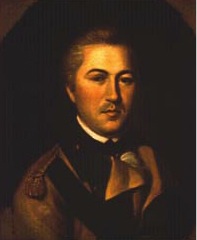Home » Early National U.S. (Page 2)
Category Archives: Early National U.S.
New Narratives in an American Story of War and Growth
Joseph R. Miller, Ph.D. Student, University of Maine
On December 26, 1799 Colonel Richard “Harry” Henry Lee (father of Robert E. Lee) delivered a eulogy for George Washington to the U.S. Congress.
First in war—first in peace—and first in the hearts of his countrymen, he was second to none in the humble and enduring scenes of private life; pious, just, humane, temperate, and sincere; uniform, dignified, and commanding, his example was as edifying to all around him as were the effects of that example lasting. To his equals he was condescending, to his inferiors kind, and to the dear object of his affections exemplarily tender; correct throughout, vice shuddered in his presence, and virtue always felt his fostering hand; the purity of his private character gave effulgence to his public virtues. His last scene comported with the whole tenor of his life—although in extreme pain, not a sigh, not a groan escaped him; and with undisturbed serenity he closed his wellspent life. Such was the man America has lost—such was the man for whom our nation mourns.[1]
Ideas, naturally, have changed over time. Few in our present society recognize that the nation’s founding father was a powerful symbol of the transition from military to civilian life in his own time. The hero of the American Revolution was also an enduring symbol of Post-Traumatic Growth before psychology was a recognized intellectual endeavor.
It is also fitting to note that, though Washington was symbol of seamless transition from war to civil life, Henry Lee’s life was much more troubled. He was a successful and noteworthy figure immediately following the Revolution, but when he was injured in riot during the War of 1812, he was permanently disabled and for a time was forced to seek a better climate in the West Indies. His memoirs came from a debtors prison and only became popular when his more noteworthy son edited them.[2] Still his memoirs are an impressive account of the Revolution and can serve as example of someone channeling trauma’s affect into a lasting a valuable collective memory of his experiences.[3] Lee’s words, like Washington’s transition illustrate how Post-Traumatic Growth has been central to the American experience of war, and life in general. The collection of essays edited by this author in the recently published Blue Nostalgia: A Journal of Post-Traumatic Growth are the continuation of larger American story of difficulty of veterans lives following conflict and an illustration of an ahistorical representation of the human experience of violence.
 The journal is available online here.
The journal is available online here.
Joseph R. Miller, “’New Narratives in an American Story of War and Growth,” Khronikos: the University of Maine graduate history student blog (blog), January 15, 2014, http://khronikos.com/2014/01/15/new-narratives-in-an-american-story-of-war-and-growth/.
[1]Henry Lee, Resolutions presented to the United States’ House of Representatives, on the Death of Washington, 26 December, 1799. There is the potential for an interesting dialogue and debate as to the originator of this idea. Tobias Lear and John Marshall are said to have coined the phrase employed by Lee in his eulogy. Robert E. Lee credits “Marshal” for the words used by Lee in his speech but his father’s quotation of them in his own speech. Henry Lee. Robert E. Lee Ed. The Revolutionary War Memoirs of General Henry Lee (Da Capo Press, 1999) 320.
[2]Charles Royster’s “Introduction” in Lee, Revolutionary War Memoirs, i.
[3]See Charles Royster. Light-Horse Harry Lee and the Legacy of the American Revolution (Louisiana State University Press, 1994).
Image Credits:
Funeral Medal: http://www.history.org/foundation/journal/winter02-03/coins.cfm Those interested in representation of Washington, both before and after his death, may enjoy the photo essay titled, Enduring Images of War.
Henry Lee: http://www.stratfordhall.org/meet-the-lee-family/henry-lee-iii/



